Len Joy's Blog, page 7
June 16, 2015
Elkhart Lake Triathlon - June 13, 2015
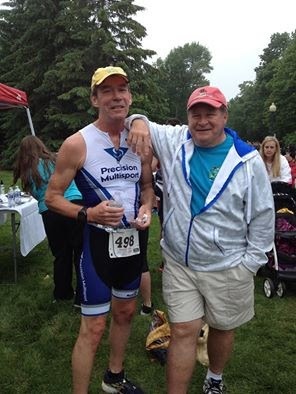 After the race with Dan Coots
After the race with Dan CootsOn Saturday I competed in my third Elkhart Lake Triathlon. It is a great venue for an Olympic Tri. It is located at the Osthoff Resort on Elkhart Lake in Wisconsin. It's spectator friendly, the lake, at least the last three years, has been smooth and reasonably warm and the bike and run courses are scenic and offer some nice hill challenges, which we don't always get in Illinois.
My favorite part of the race is that it gives me a chance to visit my friend Dan Coots and (Nancy) who have graciously provided my wife and me with pre-race lodging at their home in Appleton. Dan and I are proud members of the Canandaigua Academy Class of 1969.
I finished third this year in my age group, 37 seconds behind the second place finisher and one tenth of a second ahead of the fourth place finisher.
Here are the results for the last three years (the bike course is 28 miles instead of the standard 25 miles:
DATE TOTAL SWIM PACE T1 BIKE MPH T2 RUN PACE 6/13/15 2:58:30 33:05 2:01 3:41 1:27:58 19.1 2:30 51:10 8:14 6/7/14 3:09:33 31:49 1:56 3:01 1:33:21 18.0 3:42 57:40 9:17 6/8/13 2:56:51 31:37 1:55 4:14 1:26:44 19.3 2:52 51:24 8:16
Race Schedule:
Ricky Byrdsong Race Against Hate - June 21, 2015
Lake Zurich, IL Olympic Triathlon - July 12, 2015
USAT Nationals - Milwaukee - August 8, 2015
Another nice feature of this race is that they provide complimentary digital photos.
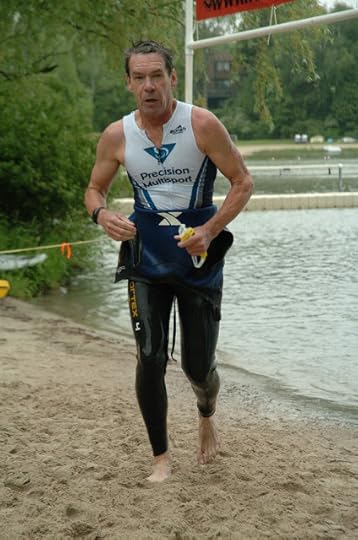
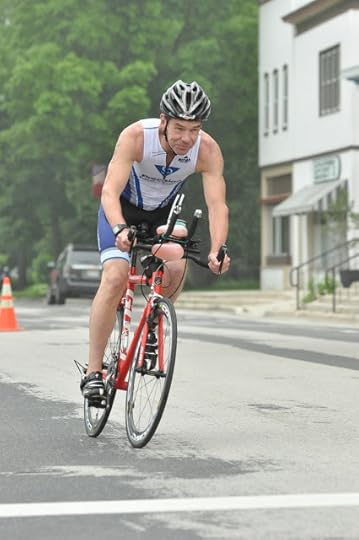
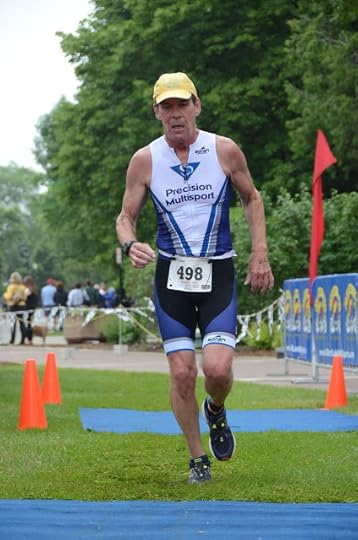
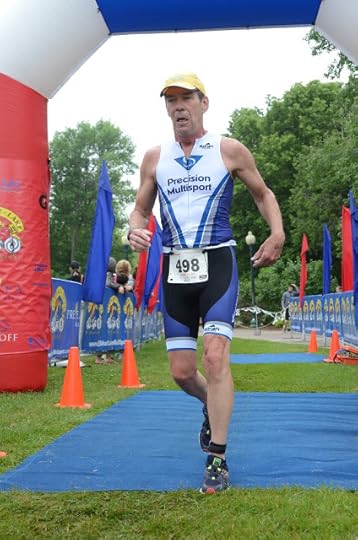
Published on June 16, 2015 12:58
May 15, 2015
Mary Bryan Cake
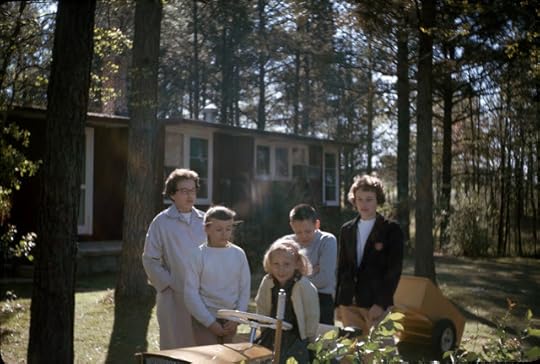
My daughter Christie is making me a Mary Bryan cake for my birthday today.
In the spring of 1961 our family took a car trip to Florida. We stopped in North Carolina to visit one of my dad's Army Air Force buddies. Mr. Hurst had a daughter, Mary Bryan (the blonde on the tractor) who baked for us a double-fudge chocolate cake. She gave the recipe to our mom and from then on for every birthday, holiday or family gathering Mom baked what we all called a Mary Bryan cake, but I'm told others know as Texas sheet cake. I like our name better.
When we were visiting Mom in the hospital last month for her 99th birthday my sisters and I started reminiscing about the Mary Bryan cake (it's featured in most of the birthday photos my dad took). We contacted my sister Carol in Arizona and she sent us the recipe, which she had rescued when we cleaned out Mom's house.
So today when Christie asked me what kind of cake I wanted for my birthday, I told her about the Mary Bryan cake and gave her the recipe. I'm sure it will be delicious.
A few years ago, just after my dad died, my mom made her last Mary Bryan cake (we were moving her to Assisted Living). I asked her what happened to Mary Bryan and she told me that Mary Bryan had died in a car accident several years ago.
She had had a hard life, Mom said. Bad luck with men. Drug problems. An earlier automobile accident she never really recovered from. I'm not sure of all the details and now it's too late to check with mom to make sure my memory is correct.
I guess it doesn't really matter. For all of us, Mary Bryan will always be that sweet little girl on the tractor.
A couple years ago I wrote a story inspired by Mary Bryan cake that was published in the Foundling Review. Here is the link to that story (it's only 500 words):
Mary Bryan Cake

Published on May 15, 2015 14:57
April 14, 2015
Life Time Tri Marquee - Tempe, AZ - April 12, 2015
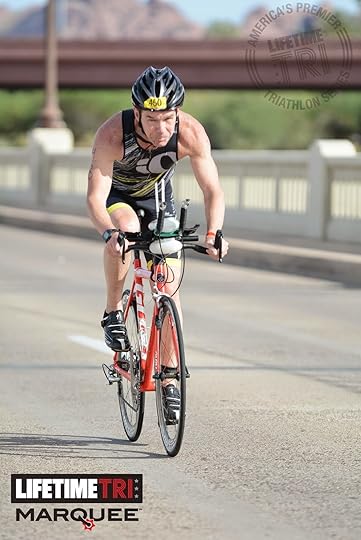
I opened my 2015 Tri season in my favorite location: Phoenix. I've never competed in a Lifetime Tri before and I was very impressed. This was a well run race with lots of support - they even provided wetsuit strippers which is rare for an Olympic distance race.
This was my first time riding outside since October, my first open water swim since September and my first warm weather run since Halloween so I was pleased with the results. That's probably enough excuses. It was a great day - not too hot - and there weren't any annoying hills like I had in California for my first race of the year.
I was passed by a 61 year old (my age group) in the last 1/4 mile. I cleverly decided to just stay a few feet behind him and save myself for the finish when I would burst passed him. Unfortunately he had sort of a similar plan and his burst was better than mine. I finished 4th in my age group but all the guys ahead of me were from Arizona so I think they had a home court advantage.
Another really neat thing about this race is that they make all their race photos available for free. And while all my race photos look alike usually, these guys came up with some interesting new angles:
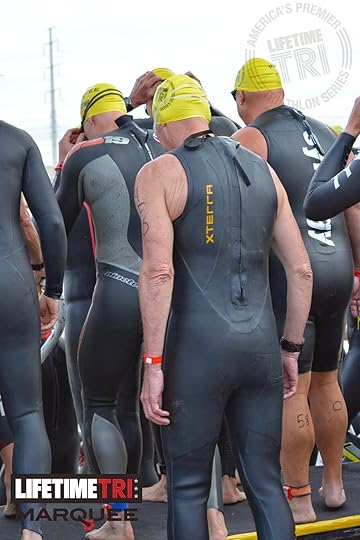 While this looks like the END it's really the beginning
While this looks like the END it's really the beginning
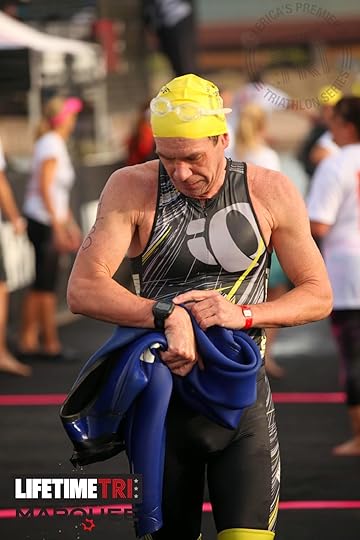 Checking my watch after they stripped off wetsuit
Checking my watch after they stripped off wetsuit
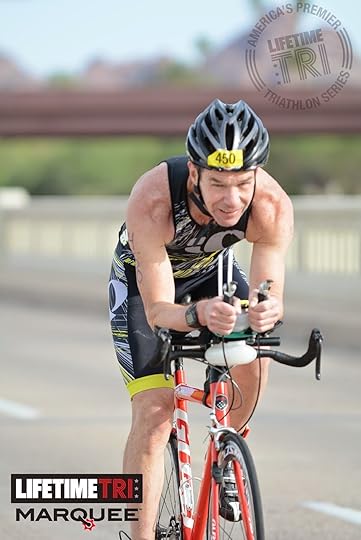 Smiling for the cameraman
Smiling for the cameraman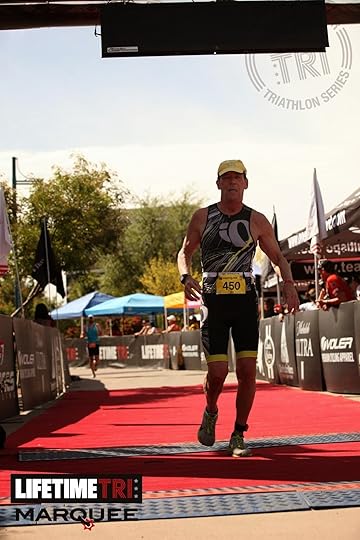 Not smiling so much at the finish
Not smiling so much at the finish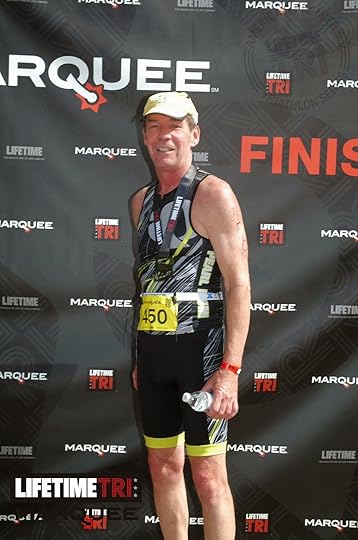

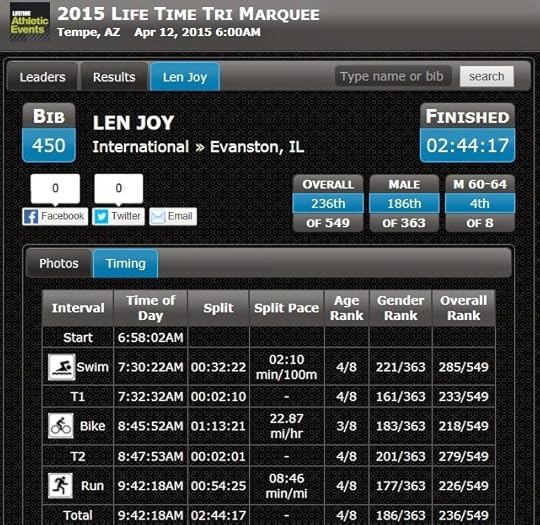
Published on April 14, 2015 08:28
March 16, 2015
March Madness Half Marathon - Sunday March 15, 2015 - Cary, Illinois
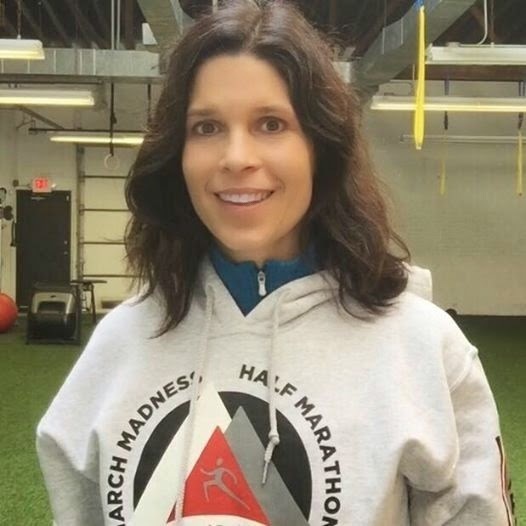
The race season has begun. I was instructed by my coach, (Heather Collins, modeling the sweatshirt above) to treat this as a training run, not a race. Since I ran the race with her I sort of had to follow her instructions.
It was a good thing I did as the last half of this course has a number of hills (not something we have a lot of in Illinois) and by taking it easy for the first six miles, I was able to run the hills without difficulty.
Actually the downhill was more challenging than the uphill. We’ve been running hills on the treadmill so I was prepared for the incline, but we never really practice downhill which uses a lot of different muscles.
This is a really nice course – and it was perfect weather – sunny and in the 40s. There were over a thousand runners this year and it is strong field. I finished 18th in my age-group with a time of 1 hour 52 minutes.
Looking forward to trying it again next year.
Next race: Lifetime Tri – Tempe Arizona – April 12, 2015
Published on March 16, 2015 09:28
January 26, 2015
Neilly Lecture - January 21, 2015 - University of Rochester
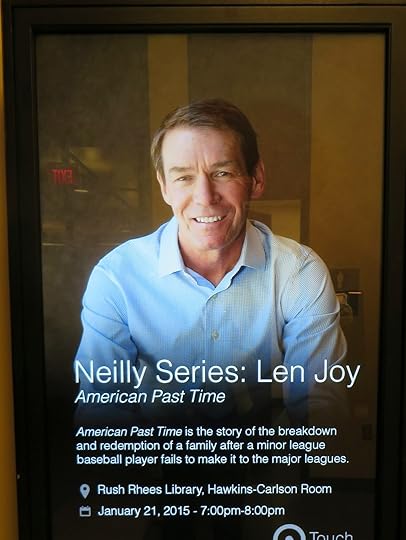
Last week I was invited to kick off the University of Rochester's Neilly Lecture Series. It was fun to return to my alma mater and I am very grateful to the University for giving me the opportunity.
Below is the text of my talk:
How to Write a Novel…
Thank you very much, Curt. I’m thrilled to be here today. I very much appreciate the opportunity to be a part of the Neilly Lecture Series. Thank you all for coming tonight.
In the summer of 1974 I moved from Rochester to a small apartment on the south side of Chicago. The first home appliance I bought was a $150 black and white television from Wieboldts. That first summer on my own I spent many of my evenings watching Happy Days, reruns of the Untouchables, and a lot of Cubs games. Every game the Cubs played was broadcast on WGN. I became one of those diehard fans pulling for the Cubs to finally breakthrough and make it to the World Series. Forty years later, I’m still waiting, but I think this year it’s going to happen.

This is a photo of the center field wall of Wrigley Field. The sign says: “Wrigley Field Home of Chicago Cubs.
The Cubs have a tradition of inviting celebrities to lead the singing of “Take Me Out to the Ballgame” before the 7th inning stretch. It’s not my favorite tradition. They have had a lot of awful conductors. Mike Ditka comes to mind.
A while back the Chicago Tribune conducted one of those reader surveys to rate the worst performers over the last decade. The runaway “winner” of that contest was NASCAR driver, Jeff Gordon.
Gordon’s remembered unfondly by Cubs fans because when they introduced him, he leaned out of the booth and with that center field sign right in front of him he told the crowd how pleased he was to be in Wrigley Stadium.
After that opening, it didn’t matter how he performed.
Openings are important. Especially for writers. If we compose a bad opening, it is very likely the reader will not turn the page.
And that’s the number one goal of a writer – to get the reader to keep turning the page.
<>
I collect books on the craft of writing. This book by Sandra Scofield called “The Scene Book” is one of the most helpful books I’ve read for providing concrete advice on what I consider the basic building block of a story.
Scofield writes, “The scene is the most vivid and immediate part of the story; It is in the scene that a writer captures the heart and imagination of the reader. It is the scene that leaves the reader with images and a memory of the action.”
Okay. Here’s a scene:
A boy walks across the university quadrangle on the first nice day of spring after a long brutal winter. The date is May 4, 1970. He is a freshman. There are a bunch of students tossing a Frisbee. One of them is an Asia n girl with long flowing hair and a beautiful smile. He knows her name because he knows the names of all the pretty freshmen girls.
She hurls the Frisbee in his direction and calls out his name. “Catch it!” she yells.
He’s surprised she knows his name. He joins the group. The girl asks him if he is going to the dance tomorrow.
She tells him that Ferguson, Davis & Jones, who have a Top 40 single, are playing in the Hill Lounge.
The boy does not like to dance. He has never heard of Ferguson Davis & Jones. He is not aware of the dance.
“Of course I’m going to the dance,” he says. “Do you want to go with me?”
She grins, like she knows something. “Sure,” she says. “I’m in Lovejoy 114. Pick me up at 8?”
Okay. That’s the classic clueless boy meets girl opening scene. I think it has a memorable image. That Frisbee gliding across the quad as a cute girl call calls out a boy’s name.
Why did the writer provide the date? Does anyone know what happened on May 4, 1970?
Kent State.
There were campus protests over the revelation of the secret bombing of Viet Cong safe havens in Cambodia. At Kent State the governor called out the Ohio National Guard.
In an inexplicable tragedy, four students were shot and killed by the soldiers.
Young people protesting the war, shot by young people who were probably in the National Guard to avoid to being drafted and sent to Viet Nam.
The news reverberated across campuses. At the boy’s school classes, are cancelled and a student rally is called for the next day.
Here is the next scene in this story:
A poker game is underway in Gilbert – the Freshmen dorm. There are five players seated at the table. The boy, who is a regular in the game, is watching.
One of the players pats the empty chair next to him. “Sit down. We need six.”
The boy tells them he can’t play. He is going to the dance with the girl he met yesterday.
Conversation at the table halts immediately. They know the girl. She is cute. And popular. They know the boy has not had a date all year. Neither have any of them. Except George.
“Are you crazy?” George asks. “No one will be at that dance. Everyone will be at the rally. It will be a dating disaster.”
The boy senses that George is right. He imagines an empty dance floor with no other couples around to hide his lack of dance skill.
“Just tell her you can’t go tonight. She’ll give you another chance.”
The boy senses that George is wrong. He’s pretty certain if he doesn’t show up at Lovejoy 114 in ten minutes the girl will not give him another chance.
The boy turns and heads toward the door. “Have a good game, guys. I’m going to the dance.”
The memorable image here is the poker table with an empty chair and five poker players who have suddenly stopped talking.
How does this story end?
They go to the dance.
Turns out George is right.
There are only three couples there and they are all great dancers. The girl says, “Let’s go to the rally.”
They stroll over to the Student Union where the rally is underway. After the speeches, they walk from the Union to the Hill to the Towers on to Phase and then over to the library. Finally, hours later, they head back to the dorms. The girl is funny and smart and easy to talk to. She is interested in him and what he thinks and does.
When they arrive at the door of her dorm room, the girl smiles and tells him she had a very good time. He kisses her. It is a really good kiss.
Three years, seven months and twenty-four days later they are married.
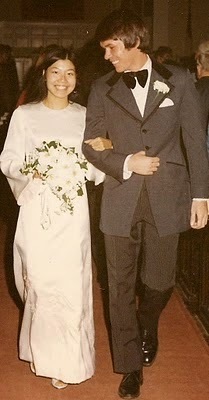
They raise three children – two girls and a boy. Forty-one years later they are still married.
I’ll return to that boy later.
<>
How does someone start a novel?
Some writers have a story they want to share. Maybe it’s semi-true – based on something that happened to them or someone they know.
Other writers might start with just a fragment
An overheard conversation. An intriguing character they encountered.
My novel started with an image.
I was driving east on Interstate 80, heading home from the Iowa Writer’s Festival. It was my first weeklong writer workshop and my brain was exploding with writerly stuff:
Point of view, story arc, dialogue punctuation rules.
About an hour into the drive, I spot, on the other side of the highway a phalanx of emergency vehicles and police cars. There has been an accident and both westbound lanes are blocked. Traffic is backed up for miles. Cars are stopped people are out of their cars, angry, upset, trying to figure out why the traffic is halted.
A mile beyond the snarl the westbound cars are still racing down the highway unaware of what lies ahead.
A man and his wife cruise by in a blue Plymouth Belvedere. I only see them for an instant but the image stays with me. The man is smiling, talking to his wife, not a care in the world.
He doesn’t know his day is about to get a whole lot less good.
Soon after I returned home from that workshop, my niece wrote and asked me if I would write a story to be read at her wedding in September.
I was honored, but I knew that trying to read a story at a wedding reception was a very bad idea.
I finally convinced her of that, but not before I had written a thousand word story called “The Toast.”
“The Toast” begins with a man driving his family down the highway.
I kept working on it and a couple years later, to my surprise, I had written a novel.
Call that American Past Time 1.0.
I had no idea where I was going with that image when I started. I didn’t know I was writing a novel. It seems like a crazy way to create something. But there are some pluses to not knowing exactly where your story is headed.
You have the opportunity to be surprised.
Robert Boswell in his book, “The Half-Known World,” argues for not knowing everything about your characters or what’s going to happen next:
“To make something fully known is to make it unreal,” Boswell writes. “Think of Disneyland, think of the speeches of politicians, think of McDonalds. The fast food goal is not to give you great food, but to give you exactly what you expect.”
Nothing from my original story “The Toast” survived except for the image of the man driving his family on the highway. Here is how American Past Time opens:
September 5, 1953
Dancer Stonemason drove through Maple Springs headed for Rolla. His left hand rested gentle on the steering wheel, and in his pitching hand he held a baseball – loose and easy – like he was shooting craps. The ball took the edge off the queasy feeling he got on game days. His son, Clayton, sat beside him and made sputtering engine noises as he gripped an imaginary steering wheel, while Dede, Dancer’s wife, stared out the window with other things on her mind.
Christopher Vogler in “The Writer’s Journey” talks about the hero’s “call to adventure.”
“…some event is necessary to get a story rolling, once the main character is introduced. The Call to Adventure may come in the form of a message or a messenger.”
Okay. My opening introduces the main character and his wife and young son. What happens next?
Dancer is the star pitcher for the minor league AAA team, the Rolla Rebels. It’s the weekend before Labor Day and Dancer hopes he will soon be promoted to the majors to pitch for the St. Louis Cardinals. That has been his dream since he was seven years old and his father took him to St. Louis to watch Dizzy Dean pitch.
When he arrives at the park, his manager, Doc Evans (the MESSENGER), tells him they need to talk:
“I had a call from Mr. Stanky this morning.” Doc pulled out a cigar and sniffed it up and down. He acted as if the Cardinals manager called him every day. “Haddix has a sore arm. They’re thinking about shutting him down. Cards ain’t going nowhere.”
Doc bit off th e end of the cigar. Dancer crept to the edge of his chair. Doc could spend ten minutes farting around with his goddamn cigars.
“So?” Dancer asked, his voice breaking.
“So they might need you for the Labor Day doubleheader Monday.”
Dancer jumped up. “ The Cardinals!” His spikes almost slipped out from under him, and he had to grab Doc’s desk to keep from falling.
“Try not to kill yourself before you get there, son.”
Dancer sat back in his seat. “But I’m still pitching today, right? My boy’s out there. He’s counting on me.”
Doc cocked his head to one side. “I can’t send you up to St. Louis with your arm dragging around your ankles.” He puffed harder on the cigar. “Tell you what. You can go three innings. That’ll keep you fresh enough so you can still pitch in two days.”
Again from Vogler’s “The Writer’s Journey”:
“Heroes come to decision points where their very souls are at stake, where they must decide “Do I go on living my life as I always have, or will I risk everything in the effort to grow and change?”
This is one of those days when everything seems to fall into place. Dancer is about to realize his life’s ambition to play for the Cardinals, his son is in the crowd cheering him on, and his pitching is magical.
Dancer cruised through the second and third innings without a ball hit out of the infield. He was in a groove – his fastball overpowering, his curveball buckling the batters’ knees. As he jogged toward the dugout at the end of the third inning, he spotted Clayton jumping up and down on his seat waving his cap. Dancer had thrown only forty pitches. A couple more innings wouldn’t tire him out.
Doc greeted him as he returned to the dugout. “Nice work, son. Bullpen can take it from here.”
“Don’t take me out. I haven’t even broke a sweat. I got plenty left.”
Doc sighed. “What do you think, Billy?”
Billy was taking off his shin guards. Dancer sat down next to him. “Can’t stop with a perfect game going. That’s not respecting the game.”
Billy shrugged and glanced over at Doc. “Not my call, Skip. That’s why you get the captain’s pay.” He went back to unhitching his shin guards.
Doc stood up and pointed his finger at Dancer. “As soon as they get a hit, I’m pulling you out.”
Dancer stays in the game and that decision changes the arc of his life. That impulsive decision is what launches the novel.
Let’s return to the boy.
Here’s a flashback to his early days.
The boy grows up in a red ranch house across the street from the high school football field of the Canandaigua Academy Braves. He has three sisters. They are nice, but not much fun to play with. He spends hours in his basement bouncing a red rubber ball against the wall. Many, many, many hours. He develops great hands.
When he plays sandlot football with his friends it is understood that he is the receiver. He can catch any ball thrown to him. He dreams of the day when he will play for the Braves. He imagines catching long passes and running clear for a touchdown.
When he is a sophomore he’s brought up from the JV team to back up the Varsity wide receiver. Late in the 4th quarter, the coach finally puts him in the game.
His father is in the stands with his brand new Super 8 movie camera, waiting for this moment.
It is the play he has dreamed about for years, except he was supposed to score. When he is tackled on the 13 yard line he is the most surprised person in the stadium. Still, it is a cool way to start his high school career and like Charles Dickens’ Pip, the boy believes he has Great Expectations – at least as far as football is concerned.
But it turns out that catch is the high water mark of his high school football career. Maybe if he had scored on that play life would have turned out differently. He might have been discovered and gone to a school with a serious football program. But instead he goes to an academic institution with a bee for a mascot and meets the girl with the Frisbee.
Okay, enough about the boy.
<>
Let’s talk about Theme.
When I set out to write American Past Time, I didn’t have a theme in mind. I’m wary of themes.
But I did have a certain notion – I don’t know what else to call it – that interested me.
When we watch the Olympics or the World Series or the Super Bowl we see all these young folks celebrated for their accomplishments. But for everyone on the podium there are hundreds, maybe thousands who had the same dream but because of bad luck or because they just weren’t quite good enough, they don’t realize their dream.
What happens to the hometown hero after the cheering stops?
In American Past Time the main character, Dancer, is struggling with his career. He knows in his gut that he is never going to make it to the majors, but it is hard for him to let go.
Three years. It seemed like a lifetime. The whole world had been out there waiting for him back then. Some folks believed that if he’d walked off that mound after three innings, he’d have gotten his chance, and he’d be in high cotton now. But he couldn’t have done that. A ballplayer doesn’t walk away from a perfect game.
Dancer rubbed his arm. The soreness was never going away. He loved baseball. Some days he couldn’t hardly believe he was getting paid to do something he loved so much. If it had been possible, he’d have played for free. But he had a family to support. He could hang on, try to scratch out a living for a few more years, but that would just make things worse for Dede and the boys.
It was time to let it go.
He pounded the ball into his glove and glanced at each of the runners. He dug his nails into the seams and went into his windup. The ball floated toward the batter waist high, begging to be slammed. Dancer could see Shepherd’s eyes get wide and the muscles in his forearm tighten as he stepped into the pitch.
But just as Shepherd was about to make contact, the ball dropped sharply clipping the front of the plate and bouncing into the catcher’s glove. Shepherd corkscrewed himself into the ground striking out to end the game.
As Dancer headed for the locker room, the crowd was on its feet cheering. He stopped at home plate and looked up as the cheers blanketed him. He doffed his cap, not boastfully, but to show respect for the game. His heart ached.
<>
I had the opportunity last summer to attend a book club discussion of American Past Time. It was fun to hear people discussing my characters and arguing about what they might do or not do. One of the younger readers asked me if it was more difficult to write historical fiction because of all the research involved.
My first reaction was: What are you talking about? This isn’t historical fiction – I grew up in the 50s and 60s. I’m not historical.
But, I have come to realize that for a large share of the reading population even the Viet Nam war is distant history.
It was clearly a tumultuous time to grow up.
The civil rights movement – the boycotts, the Freedom riders, the march on Washington – those were all vivid memories from my youth.
The assassinations. President Kennedy in 1963, Malcolm X in 1965 and then in the spring of 1968, Martin Luther King and Bobby Kennedy killed in a two month span.
And throughout the sixties and early 70s there was the war in Viet Nam.
I was number 343 in the second draft lottery. It’s the only lottery I’ve ever won.
The era wasn’t all protest and violence. We had the space program.
Alan Shepherd, Gus Grissom and John Glenn were names that didn’t require any identifying labels.
Neil Armstrong walked on the moon, July 29, 1969 – seven weeks after I graduated from high school. The whole nation was watching.
I used that event in the novel for a scene with Dede and her son Jimmy, who was captivated by the space program.
Suddenly the scene on the TV screen switched from the control room to a grainy black and white image of a man in a spacesuit descending slowly from a ladder.
“How did they get the camera up there?” Dede asked.
Jimmy slipped off the couch and scooted up close to the television. “The camera was attached to an equipment pallet on the side of the Lunar Module. It unfolded when Neil Armstrong stepped down the ladder. This is so cool!”
The astronaut, a white blob with a backpack, stood on the bottom rung of the ladder and put his foot down several times, like a man testing the water temperature in the pool. Finally, he slow-motion jumped off the ladder. “That’s one small step for man…one giant leap for mankind.”
Jimmy stood up and clapped his hands. “They did it!”
Dede jumped up from the couch and clapped too. She took hold of Jimmy’s hand and squeezed it hard. Tears were running down her cheeks.
“Do you think you’ll fly to the moon someday, Mom?”
Dede smiled. “I think you’ll have to go for me.”
So that was my history and while obviously I was not a part of any of those events, they clearly shaped my life.
<>
This is probably a good time to mention one of my less positive memories from my days at Rochester.
I had two secret goals when I left home. One was to play professional football (I saw myself as the next Fred Biletnikoff) and the other was to become a world famous author.
 Hemingway
Hemingway
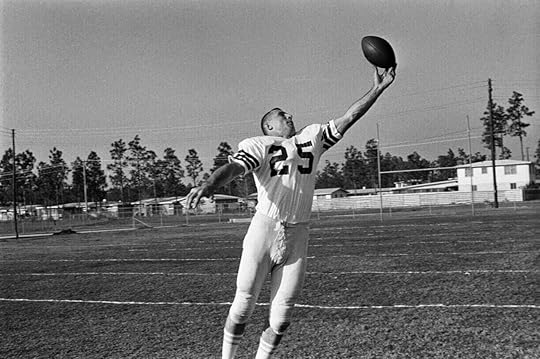 Fred Biletnikoff
Fred Biletnikoff My football dream didn’t last long. Despite those marvelous hands, I was put on the kickoff team. My job was to run down the field and hurl my body at the wedge of blockers. I was a skinny kid and the coaches didn’t expect me to knock anyone down, they just hoped I would distract the blockers so the guys who knew how to tackle could swoop in unimpeded and grab the ball carrier.
I wasn’t very good at it.
By my junior year I was in the stands cheering for the Yellowjackets.
My other dream didn’t survive either. I chose to be an English major my first year as that seemed the appropriate launching pad to become a world famous author.
But in the second semester of my first year, a few weeks before I encountered that Frisbee, I received an excoriating critique from my early American Literature professor on my term paper.
I was devastated. I decided I wasn’t destined to write the great American novel and I changed my major to Economics.
After graduation, and a decade in the corporate world I went into business for myself. For fifteen years I owned and operated an engine remanufacturing company. I commuted between Chicago and Phoenix, logging over a million air miles. On those long flights I would read literary magazines and novels and sometimes I would write poems and short stories about people I encountered.
In the fall of 2003 I wound the business down.
I realized if I wanted to become a writer I needed to stop wishing it would happen and do something about it. So I began taking writing courses at the University of Chicago’s Graham School and attending summer writer workshops. Over the next several years I participated in workshops at Iowa, Tin House, Squaw Valley, Skidmore, Norman Mailer, Sewanee and Bread Loaf.
Workshops, at least for me, were a valuable tool in my development.
I think my years in business dealing with the unvarnished opinions of customers and employees helped me to learn how to deal with literary criticism.
Even myopic, ignorant, snarky comments can have some benefit. You just have to have a good filter.
Take what’s useful, discard the rest.
Don’t try to satisfy everyone.
Ignore prescriptions.
But try to understand what is causing the reader to suggest a solution.
What I often encountered in my early drafts, was a desire by readers to understand what Dancer is thinking.
Why doesn’t he share his feelings more? They would ask.
And while all of these characters are absolutely one hundred percent fictional, I can say I empathized with Dancer’s unwillingness to “share.”
But I couldn’t ignore an issue that was brought up so frequently.
In later drafts I let Dancer share more of his thoughts, but mostly I tried to convey his feelings through his actions.
For example, here is where Dancer has a confrontation with Brandon Thacker who has been trying unsuccessfully to get Dancer to join the Klan.
It was nearly four when Dancer finally finished his pour and made it back to the locker room. The room smelled of Lysol, sulfur, sweat and piss. In the middle of the floor was a large circular steel sink with a foot pedal to turn on the water.
Brandon Thacker huddled in front of the sink talking with a couple of his Klan buddies. Dancer stepped around them, leaned into the sink, and stuck his head under the ring of water.
“Ah, Stonemason, don’t wash it off. You look just like one of those bug-eyed nigra children down there in Alabam.”
Dancer shook the water out of his eyes. He was tired. Tired of the job. Tired of all the Klan bullshit. Tired of Brandon Thacker. With rattlesnake-quickness he grabbed Brandon by the throat and pulled his face under the ring of water. Brandon sputtered and flailed, but Dancer had a steel grip. The men laughed at first, but when he didn’t let him go, the laughter faded. The locker room became silent, except for Thacker’s frantic gasps. No one made a move to stop him.
Dancer felt strong. He was in charge again. He tightened his grip on Thacker’s throat. It would be so easy with just a little more pressure to crush his windpipe. Thacker’s face turned purple as he ineffectually clawed at Dancer’s hands.
Kelly came up next to Dancer and squeezed his shoulder. “Boss-man ain’t going to like you drowning his boy.”
“He doesn’t like me anyway,” Dancer said. He stared down at Thacker and jerked him out of the sink and set him back on his feet. Brandon wobbled, but stayed upright.
I think Dancer’s feeling are clear there.
For years I was a recreational runner. About the same time I started taking those writing classes I began training at a local triathlon club.
The two activities – writing and triathlon training – complement each other.
They both require discipline. A willingness to stay the course.
And both, at least for most people, require professional training. You don’t know what you don’t know.
I always believed that to become a better runner I needed to run more. Run every day. Run longer. Push my body.
But when I started training with professionals, I learned to run smarter. Have structured workouts, days off to let the body recover.
The same approach applies for writing.
Just sitting in a chair pounding on the laptop isn’t necessarily productive. Sometimes when I’m working out, I find myself thinking about the novel and seeing things differently. More clearly.
A long run can be a great opportunity to try out new dialogue. (Although sometimes people look at you funny.)
Here’s what Verlyn Klinkenborg who was the rural life writer for The New York Times for years says about writers in his book, “Several Short Sentences about Writing,”
“Most aspiring writers write too soon.
Everything they know about writing – all those images of writers writing --
Hastens them to their desk,
Where they sit perched over the keyboard,
Caught in an anticipatory gesture,
Eyes intent on the possibility of the screen,
Poised at the brink of thought, but not actually thinking.
As though by leaning forward a sentence will tip out of their heads
And onto the page.”
<>
Let’s talk about getting published.
The story my niece had commissioned in 2005, evolved, over the next two years, into a fifty year, 300 page epic novel which I was convinced was “ready” for huge commercial success.
In 2007, I started searching for an agent.
I followed the rules and sent out the perfect query letter, targeting the literary agents who would have the most interest in a multi-generational story of baseball, small town life, civil rights and the space program. That covered a lot of agents, but apparently none of them saw it the way I did. I can’t say for certain because there was no response.
I hired an author/editor to read it.
She said: good characters, interesting story, but you skip all the tough scenes.
I rewrote it again, with more guts.
In June 2009 I read the prologue of this new version at an open mic in Chicago.
The crowd was… polite.
I started over.
Chapter by chapter.
Finally in 2011 I got my big break. A woman I met at the Iowa Writers Festival happened to be related to the editor of Grove-Atlantic and she convinced them to read the manuscript.
Grove-Atlantic – the publishers of the Viet Nam war bestseller “Materhorn.” Karl Marlantes, the author of Materhorn had struggled for thirty years with his novel before being discovered by Grove.
They were my dream publisher.
Meanwhile on my triathlon quest I was making progress. In 2011 I qualified for the Nationals at the Olympic distance. My coach persuaded me to try the Ironman at Coeur d’Alene, Idaho that was held in June 2012.
The Ironman is a 2.5 mile swim, 112 miles on the bike and a 26 mile run.
We trained intensely for six months.
At 6 a.m. on June 6, 2012, I waded into the frigid waters of Lake Coeur d’Alene with 2,500 other triathletes.
It took me 92 minutes to complete the swim. That was a good time for me.
But on the bike course, I struggled with the last, long uphill climb. The wind shifted into my face and my “speed” slipped from 8 to 7 to 6 to 5 mph.
Most people can walk faster than that.
Then, with sweat dripping in my eyes and my leg muscles burning, I remembered the final words of the inspirational video they showed us the night before:
“The only thing you can control is your attitude.”
It sounds hokey, but it worked.
I stopped cursing the mountain, and ordered myself to enjoy the ride. I was up and over that final hill before I realized it.
And even though I had never attempted a marathon, I ran – very very slowly – the entire 26 miles. As I entered the homestretch, which even at the 15th hour was still lined with cheering spectators, I heard the announcer say my name and then do a double take.
“Wow, sixty-one years old! His first Ironman! Len Joy! You. Are. An. Ironman!”
I sprinted the last ten yards.
Soon after the Ironman race, Grove-Atlantic gave me their answer.
It wasn’t what I wanted to hear.
Good story, but too many characters covering too many years. I was discouraged, but by now I had spent over six years on this novel.
I couldn’t stop now.
I rewrote it again, cutting out thirty years and half the characters. Now I only had a mini-epic.
Despite years of rejection, I confidently sent my query to the top tier agents.
And then to the agents who had indicated an interest in this kind of novel;
And finally to anyone who was accepting queries.
No response.
In the previous round of queries I had moved up the food chain of agent rejections to the “Not right for us, Thanks for submitting” email. Now I was back to the, “Let’s not respond and hope he stops bothering us,” level.
I reluctantly posted a notice on my blog in September 2012 that I had given up on the novel.
A week later, three months after I had completed that Ironman competition, I was contacted by the editor of Hark! New Era Publishing.
A new company.
They said they would be interested in publishing “American Past Time,” if I were willing to make some structural changes. They were not minor changes.
I looked at what they wanted and I had a feeling very similar to what I had felt three months earlier on that bike trail at Coeur d’Alene.
I think it’s called despair.
My first reaction was that what they wanted was impossible, but I decided to try it anyway. I had to completely restructure the novel and rewrite most of the chapters.
But this time I had someone working with me, invested in the outcome. It took another year, but with their help I wrote a much better book.
Finally, in April, eight years, nine months and three days after my niece asked me to write that story, American Past Time was published.
And if life were a novel, that would be the end.
But life goes on.
I am excited to be published and even more excited that people have read the book and some have honestly loved it. I have had some really great reviews, and not all of them have been from friends and family.
But it is difficult for an unknown writer with an unknown publisher to get noticed. So I am extremely grateful to the folks at the University for giving me this chance to talk to you all. And I am officially forgiving that English professor who ripped, deservedly so, my paper on Thoreau.
Thank you very much.
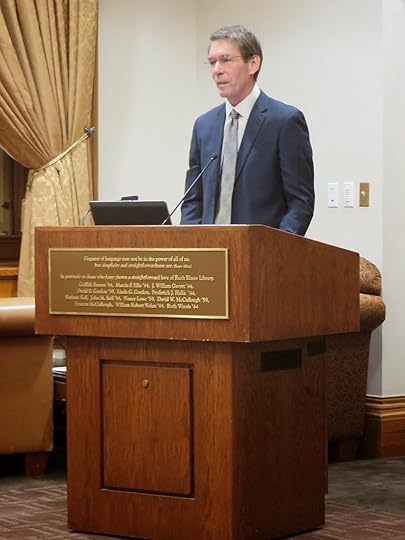
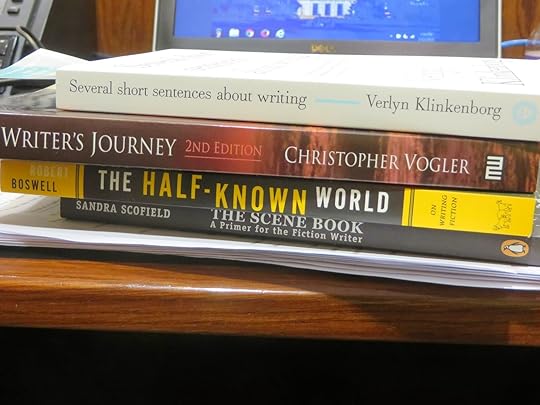
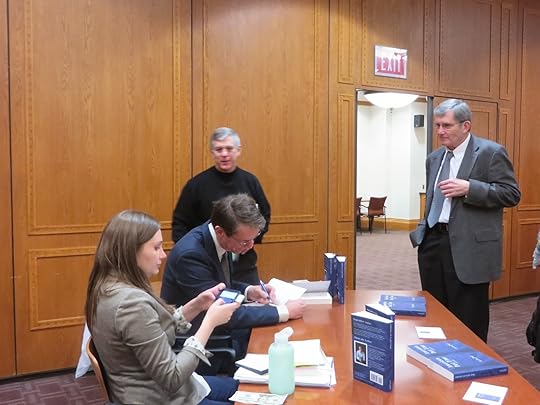
Published on January 26, 2015 11:08
November 28, 2014
Evanston Flying Turkey 5K - November 27, 2014
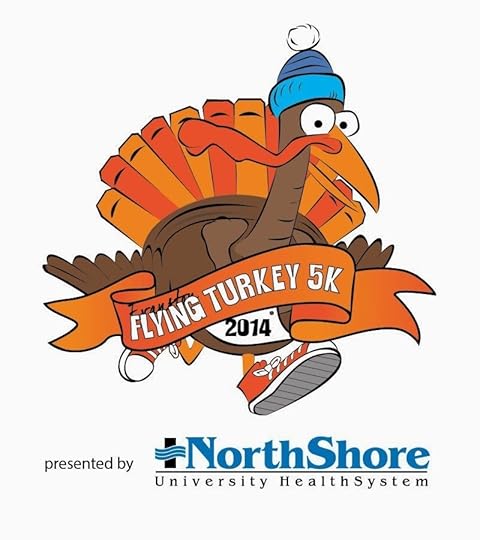
Yesterday they held the third annual Evanston Flying Turkey 5K. It was a great day for a race, sunnyish and the temperature, according to my Garmin was 25 degrees.
It was a fun race because most of the folks I run with all year round were there: Lois Moeller (who finished 2nd in her age group), Clarissa Lau, Noah Jaffe, Lisa and Matt Bowker, Mary Dolan and even our coach Heather Collins (who finished 1st in the 40 to 44 age group, but unfortunately is in the 45-49 age group and there she finished 4th.)
Two years ago I finished in 23:45 and was 3rd in my age group. Last year I improved to 2nd place with a time of 23:15 and this year I took first in my age group with a time of 22:30 - a 7:15 pace. Maybe I should retire.
The whole family is home for Thanksgiving. We don't have what could ever be described as an early-rising family (except for me.) So generally I don't expect to see a gaggle of family members cheering for me at the finish line. But yesterday Christie (home from London and working on her jewelry creations from our home - see earlier posts) got up and rode her bike over to the race and made in time to see me finish. That was a nice surprise. And it was easy for me to spot her because she has pink hair. (she's an artist).
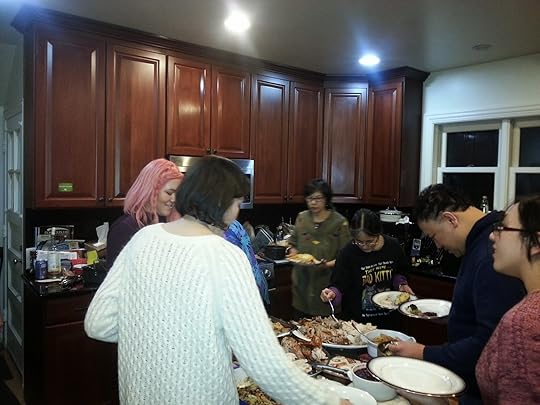 Christie, Nicole, Elaine Wong, Joanne Tanaka, Art & Stephanie
Christie, Nicole, Elaine Wong, Joanne Tanaka, Art & Stephanie
Published on November 28, 2014 09:09
October 6, 2014
Cemetery Memories

My family does not have a well-established tradition when it comes to cemeteries. This differs from my wife’s side of the family – Japanese are really into the honoring of ancestors – they have traditions squared when it comes to the departed.
I have two family-related cemetery memories. Years ago my sister Carol shared with me a shocking photograph of our Grandmother Burr (my mom’s mother). My memory of my grandmother was of a very proper ancient woman whose hair was permanently configured into a grey bun. She was grandmother-friendly, but she had been a schoolteacher for about seventy years and even as a little boy I knew she was a serious person.
The photograph my sister showed me was of a teenage girl, with flowing dark hair smiling provocatively as she leaned against the Burr family gravestone. Carol claimed that was our grandmother at sixteen. I had my doubts, but it was a really cool photo.
My other memory is from when I attended the funeral of my Aunt Beulah a few years ago. When they had buried her husband Walter in 1956 in the family plot, they must have decided they could save some money by adding Beulah’s name to the gravestone, giving her birth date and then her death as 19_ _. But Beulah lived well into the 21stcentury and we all had a good laugh at that cost saving measure.
I am in Skaneateles for the week – we flew out here to attend my 45th high school reunion and to visit my mom. The bed and breakfast where we are staying on this trip is just a couple blocks from the cemetery where my dad is buried. I had not been to the gravesite since the funeral, but with typical male confidence I was certain I could find his grave.
The cemetery was larger than I remembered and it turns out that a lot of gravestones look alike. I had to admit to myself that I wasn’t even sure what year my dad died. Some days it feels like he has been gone just a year or two and other times it seems much longer. My guess was five years and I started walking through a section where most of the deaths were in the 2006 to 2008 range.
I finally decided this was one of those situations where it was okay to ask for directions so I called my sister Kendra who lives in town. She didn’t answer. I hung up the phone and started to walk down the hill and out of the cemetery when I spotted Dad’s monument.
My dad had a good life – grew up on a farm, serve his country as a pilot in World War II, had a good marriage, raised four remarkable children. He always told me he wanted to live his three score and ten so he exceeded his own goal by twenty one years.
According to his gravestone Dad died on October 5, 2008 – six years and one day ago. If I had visited yesterday it would have made for a better story. But I’m glad I visited today. This was a perfect fall day: bright blue sky, the air cool, but the sun warm, the leaves still on the trees, and just starting to turn orange and red and yellow. It was the kind of day that makes you glad to be alive.
Published on October 06, 2014 19:28
September 14, 2014
North Shore Triathlon - September 14, 2014

When I had my surgery on August 13, my secret goal was to recover in time to participate in the North Shore Triathlon. This triathlon, which began last year, was brought to life by Craig Strong and his team at Precision Multisport, where I train.
Last year my daughters joined me for the race. It was their first tri experience so of course it rained the entire time. They said that didn’t discourage them, but this year Christie was safely back in London and when I asked Nicole if she would like to do it again, she gave me a funny look.
When I went to see my surgeon for my first post op checkup he was not enthusiastic about my triathlon plan. Actually he said “No biking!” I wasn’t really going to argue with him as I had already tried biking (just a few miles) and it wasn’t super comfortable. I came up with a backup plan. My friend Zeev Saffir volunteered to do the bike segment for me. Zeev is 30 and I have to confess he might be slightly faster than me on my best days on the bike so he was an excellent choice.
The air temp was only about 45 degrees as we prepared to enter the water. But that was actually a good thing as it made the 54 degree water feel warm. Well at least not unbearably cold. I had predicted to my coach (Heather Collins) that I would do the swim in 8:30 and I finished in 8:28 which is probably the first time I actually did better than I predicted. Heather has worked on my swimming form a lot this year. Last year in this same tri I took 10 minutes to complete the course.
Another great thing about having Zeev waiting to do the bike segment was I could hand off the racing chip to him before I took off my wetsuit. That definitely helped our transition time as I was shaking so much it took me about five minutes to get the wetsuit off.
I finally warmed up and was ready when Zeev finished the bike segment. He zipped around the course in 36 minutes, averaging just over 20 mph.
I had predicted for my run a 5K time of 24 minutes but it took me 25:23 to finish. I blame the cold.
Zeev and I finished with a time of 1:13:49. I had predicted a time of 1:14. We would have finished second in the relay competition but we weren’t consider a true relay so we finished first in our own special two man division.
It’s a great race. Beautiful location and Craig Strong and J.P. Bordeleau and a ton of volunteers really made it a rewarding experience. Lots of first time triathletes had a chance to compete.
 Zeev Saffir and Nikki Kopelson
Zeev Saffir and Nikki Kopelson
Published on September 14, 2014 10:29
August 26, 2014
The Writing Process - a conversation with Andrew Stancek

Gay Degani, a great writer and good friend, asked Andrew Stancek and me to join a literary blog tour about the writing process, and we agreed, even though we are not really touring kind of guys. Since Andrew doesn’t have a blog we’re going on tour together – basically having a long range conversation (Andrew was born in Bratislava and now lives in a small southwestern Ontario town close to Lake Erie and I live in Evanston, Illinois in close proximity to the 2017 World Championship Chicago Cubs.)
But first meet Gay Degani and Susan Tepper as they converse on their writing process on Gay’s blog “Words in Place” http://wordsinplace.blogspot.com/
And now the discussion between Andrew Stancek and me.
1). What are you working on?
Andrew Stancek – Too many projects, too little time. After devoting about two years to mostly flash, in the last year, in addition to dealing with cancer recovery, I’ve been wrestling with two very different novels. One is a historical piece, set in 1944 in the Tatra Mountains of Czechoslovakia, and the intended readers are in the 12-16 age group. The other is a post-apocalyptic one for the Hunger Games fans. I have completed a twelve-part magic realist novel-in-stories for Pure Slush and am hoping to compile into a collection my Mirko pieces about a teenage hoodlum in sixties Bratislava. I have about thirty of those pieces done and when time allows I will fill in missing gaps with about twenty more and then set about getting them together as a collection. I do still occasionally write flash. I also….(laughter) Yes, I AM crazy. Just too, too many stories come pouring out of me. And since I retired about a month ago I’ve been wondering whether I should do something other than writing. But probably not.
Len Joy – I totally agree with you. You are crazy. I would never be able to keep all of the characters and plots straight. I had enough trouble with one story. But let’s back up. You mention your cancer recovery and you’ve been helpful to me in sharing your story (by the time this blog posts I will have undergone the same kind of prostate surgery that you have already had). I know that for me, being told that I have cancer (mine is very early stage) has not exactly been a wakeup call, but it has been a reminder that I am probably not going to live forever. It took me almost nine years to write “American Past Time,” which was published in April.
If I was thirty or maybe even forty I might be satisfied that I had the important first novel finally published and I would have started on the second novel, not caring quite so much that hardly anybody has discovered my masterpiece. I am working on the sequel to “American Past Time” titled “American Jukebox”.
It takes place thirty years later so I’m not sure if that truly qualifies as a sequel, but it is going to have many of the surviving characters. The big challenge for me is that where “American Past Time,” takes place over twenty years, “American Jukebox,” takes place on a single day in 2003.
As I said, I “should” be plowing full speed ahead on that novel, especially since I don’t know that I have the luxury of spending another nine years to write the book. While I am working on it, I’m also spending a fair amount of time and money to promote “American Past Time.”
That probably doesn’t make good business sense – with so many good books out there a book written by an unknown writer published by a small unknown publisher has lottery ticket chances of being discovered. But people enjoy playing the lottery and I enjoy my Sisyphean effort to gain attention for my novel. I’ve learned a lot about promotion, publishing and people. (going for that alliterative thing). “American Past Time” has had a gratifying number of good reviews (33 on Amazon right now) from readers of all ages. The story is especially appealing to folks who grew up in America in the 60s and 70s. It might not resonate quite so much if you grew up in Bratislava.
But enough about me, Andrew. How has the cancer-thing affected your writing process?
Andrew: Oh, my. Terrific question, Len, and I have an enormously long answer which would bore you and everyone else to tears, so I’ll cut it to bare bones. The main difference is focus. I was faced with the real possibility of imminent death. I had to accept, even embrace it. Then I spent eight weeks recovering, wrestling with where I’ve been and where I hope to be, what I’ve accomplished and what I hope to accomplish in the future. That particular kick in the gut has been transformational. I have decided I needed to become a different human being and not return to what I was. I still have that determination.
Although I returned to my day job, I was changed. Now, eighteen months later, I have retired from it, earlier than I would have otherwise. Issues which seemed important before no longer are. I am questioning every aspect of my life. I am continuing a discerning process. I may turn to totally different career options. I may leave writing altogether. Probably not, but it is a very real possibility.
With that in mind, I believe the writing I have done since the surgery is weightier, deals with larger issues. While I love flash, and owe much to it, it is not exactly read by a large audience. If I am going to continue as a writer, I have to find a larger audience and share something significant with that audience. I have a finite amount of time left and I have to make it count, and I have to value the time of my readers as well. Early in my recovery I was reading John Green’s The Fault In Our Stars, a book dealing with cancer. He has masterfully shared something real. I am unlikely to ever write about cancer, but I also cannot write any more about lighter issues.
Len– I think according to the script were now supposed to talk about genre. But those discussions always annoy me. I think we’re allowed to skip the questions we don’t like or understand. So let’s move on to the next question, which is:
“Why do you write what you do?”
Len – I’ll go first.When I was winding down my business career ten years ago, I had a vague notion that I would try to be a writer again. That’s what I had planned to be when I went to college (well that was my stated plan; my secret plan was to become an NFL wide receiver in the mold of Fred Biletnikoff, but that didn’t pan out.) I abandoned my nascent writing career after my paper on Thoreau was harshly criticized by my freshmen English professor.
I changed my major to Economics and became a business guy. For me, at that time in my life, it was the right decision.
But after thirty years of building up life experiences, I had more confidence and more resilience to criticism and I started taking writing classes. I naturally chose to write about stuff where I had experience: factories, sports, work life dynamics.
I don’t think you only have to write what you know, but I think you have to sort of know it. For example, I worked in a foundry for a few months. Long enough to know that I really didn’t want work there the rest of my life. It was hot, dangerous, but worst of all it was mind-numbingly tedious to stand in one place for eight hours.
I certainly don’t “know” that job. Not like someone who had been showing up at the foundry every day for years. But I had enough of the experience to convey convincingly (I hope) what that life was like.
You mentioned career possibilities and even the possibility that you might give up writing. I find even when I’m not writing, I’m writing. Most of my contact with the world is online so I probably write thousands of words a week, just communicating or perhaps bloviating on topics that of interest.
One of those is fitness. I compete in triathlons. Hope to continue doing so after my surgery, but can never tell. Maybe I’ll not be able to return to levels I was at before. Nevertheless I expect to keep physically active and I’m thinking be an opportunity to write about the subjects of aging and health and staying fit.
Okay, your turn.
Andrew: Why do I write what I write? An unanswerable question, so of course I’ll go on to answer it. (Still more laughter.)
The first and most obvious answer is “because I have to.” Very much like “why climb Mt. Everest?” Because it’s there. At a certain point all these words started bubbling to the surface and I had little choice but to put them on paper. There is a Slovak fairy tale (I am extremely indebted to fairy tales, and of course to my Slovak background) in which the porridge pot goes into overdrive and the porridge keeps pouring out, out of the pot, all over the stove, fills the kitchen, the house, the village and on and on. Sometimes I have that sensation with my stories. Words rush out, more and more and more. That is probably why no matter what I end up doing with my life, I’ll have to keep on writing, simply because the words won’t stop pouring out.
I wrote a large number of stories based in Slovakia, usually with young protagonists, or older men returning to Slovakia. After a lot of judicious pruning I started thinking maybe I have something there, maybe these are not just for my own amusement. Eventually I took a writing workshop with one of my idols, Alistair MacLeod, and at the end asked him point blank whether he saw hope in my work, and he not only unequivocally said yes, but asked me to revise a story he’d seen, and he published it in The Windsor Review where he was fiction editor. He died recently and I truly miss him. He was one of the great writers of the 20th century and an enormously kind and supportive human being. But since Alistair’s encouragement, I’ve been sharing my outpourings. Mirko, one of my continuing protagonists, now has about thirty stories published and he’ll have a collection at some point. I’d like to finish a short story collection. I have those two novels on the go. But why, why I cannot answer. I have to.
Len – That seems like a good reason. It reminds me that as writers, we all need feedback but maybe more important, we need encouragement. It’s amazing how beneficial a sincere compliment can be. I think the last question to tackle is
How does your writing process work?Len - I have a broad definition of what constitutes writing time. I include the time I spend reading and reviewing because all of that helps me to be a better writing. I also spend a significant amount of time thinking about a story or chapter or scene that I am working on while I’m running or on my bike or swimming. Or in the shower. Sometimes I take really long showers.
For the writing part of writing – I usually try to write a scene at a time. I have an idea how I want the scene to work, but I don’t have a lot of specifics until I start writing it. When I’m done with the scene, I print it out and liedown on my couch and read it and mark it up. I like revising and I will revise it for a few days usually and then go on to the next scene.
I guess that process reflects the kind of writing I do. Most of my stories are dialogue and action. There is not a lot of interior. I tend to show what is going in my characters heads through their actions and words. That is probably because I’m not good at making lengthy narrative ruminations interesting. It is an area I’m trying to improve. In the sequel to “American Past Time” the main character is starting to lose his memory and I think I’m going to have him alone in most of his scenes as he struggles to hold on to his memories.
So what about you, Andrew? What does your writing process look like?
Andrew – Another impossible question. I’d like to say that there is a routine, and that A is followed by B and then C. But no such luck.
Until a month ago I was working full-time so all my writing time was stolen in snatches from various parts of the day. Often I hoped to write at night, but found I was too exhausted from the day itself, work, family. Weekends, sometimes, always piecemeal.
And as I mentioned earlier, I usually have a large number of projects on the go, and don’t necessarily return to the one I was working on the previous day. Usually I work on the computer, sometimes long-hand. It is quite amazing I got as much done as I did. Now I may have more time. I am discerning and perhaps I’ll throw myself into some other career, lion-taming, juggling, levitating, or perhaps just exploring other parts of the universe. Bringing about world peace may be an option, or finding a cure for the common cold. Not sure yet. Or perhaps the stories will continue pouring out and I’ll try to put them on paper before they get too soiled. I’d like to put closure to the large projects before trying something totally new, but who knows?
Here are links to two recent works: Why I Write Flash Fiction The Small Sailing Cloud Len: I think we can end there. Andrew, it’s been a pleasure, as always. Len Joy's first novel “American Past Time” was released April 19, 2014 with Hark! New Era Publishing. He is the author of two short fiction collections, “Casualties” and “Survivors.” His work has appeared in FWRICTION: Review , The Journal of Compressed Creative Arts, Johnny America, Specter Magazine , Washington Pastime, Hobart , Annalemma and Pindeldyboz .
He is a competitive age-group triathlete. In June 2012 he completed his first (and probably only) Ironman at Coeur d’Alene, Idaho.
<> Andrew Stancek grew up in Bratislava and saw tanks rolling through its streets. He now writes, dreams and entertains Muses in southwestern Ontario. His work has appeared in Tin House online, Every Day Fiction, fwriction, Necessary Fiction, Pure Slush, Prime Number Magazine, r.kv.r.y, Camroc Press Review and Blue Five Notebook, among many other publications. He’s been a winner in the Flash Fiction Chronicles and Gemini Fiction Magazine contests and been nominated for a Pushcart Prize. The novels and short story collections are nearing completion.
<>
Next up on the Writing Process Blog tour: Bonnie Zobell, Sequoia Nagamatsu, and Michelle Elvy.
Bonnie ZoBell's new linked collection from Press 53, What Happened Here: a novella and stories , is centered on the site PSA Flight 182 crashed into North Park, San Diego, in 1978 and features the imaginary characters who live there now. Her fiction chapbook The Whack-Job Girlswas published in March 2013. She received a National Endowment for the Arts fellowship in fiction, the Capricorn Novel Award, and a PEN Syndicated Fiction Award. She received an MFA from Columbia University on fellowship, currently teaches at San Diego Mesa College and is working on a novel. Visit her at www.bonniezobell.com.
Sequoia Nagamatsu's stories have appeared or are forthcoming in publications such as ZYZZYVA, Redivider, The Bellevue Literary Review, Puerto Del Sol, The Fairy Tale Review, and One World: A Global Anthology of Short Stories. He is a visiting professor at The College of Idaho.
Michelle Elvy lives and works as a writer, editor and manuscript assessor based in New Zealand and currently sailing in Southeast Asia. She edits at Blue Five Notebook , Flash Frontier: An Adventure in Short Fiction , and Awkword Paper Cut , where she also curates the Writers on Writing column. She is Associate Editor for the forthcoming Flash Fiction International (W.W. Norton, 2015), and has guest edited at Smokelong Quarterly and lent her reading eye to a number of competitions. Her poetry, prose, nonfiction and reviews can be found in a variety of journals and anthologies, most recently in JMWW, Word Riot, The Linnet’s Wings, Takahē, Ika, Html Giant, PANK, Eastbourne: An Anthology and 2014: A Year in Stories . She has been interviewed about her somewhat unorthodox lifestyle in The New York Times , The Review Review and the Family Adventure podcast series. More at michelleelvy.com (editing), Glow Worm (poetry & prose) and Momo (sailing).
Published on August 26, 2014 08:56
August 11, 2014
Wednesday is the First Day of the Rest of My Life
In March, after my annual physical flagged an increase in my PSA level, I had a biopsy done, which revealed I had early stage prostate cancer. I want to say “VERY early stage,” but as writers we learn to avoid the use of meaningless adjectives.
My doctor outlined the treatment options. The first option was “watchful waiting,” but that seemed most appropriate if it looked like there was something else on your health horizon that would kill you before the cancer did. The second choice was radiation. That would require going to the hospital every morning for six months at six a.m. It would clearly interfere with my 5 a.m. workouts. The third option was surgery, either standard incision or robotic. The robots took four hours and the surgeon only took one, so I opted for the old-school approach.
The doctor then outlined all the possible side effects. None of them were appealing. I’m planning on “None of the above.”
Then it was just a matter of scheduling. I told the doctor I had a book launch scheduled for early April. He said that wouldn’t be a problem because his calendar was full until May. Then I told him I had qualified for the USAT Nationals in August and had been training all winter. I really didn’t want to miss that race. He looked like a runner so I think he understood. He said he had no problem with me waiting until after the race.
Then I remembered that I’d signed up to run in the Wisconsin Marathon with my coach in early October. The doctor gave me a funny look and told me to forget about the marathon.
Before I competed in the Ironman at Coeur d’Alene they told us that the only thing we could control during the race was our attitude. In every race since then I’ve been sticking an Ironman tattoo on my shoulder (the kind that wash off) to remind me of that. Tomorrow I’m going to use one of those tattoos as part of the pre-op prep. Then on Wednesday I will have the surgery.
I am expecting a good outcome.
Prayers welcomed.
Published on August 11, 2014 08:57



